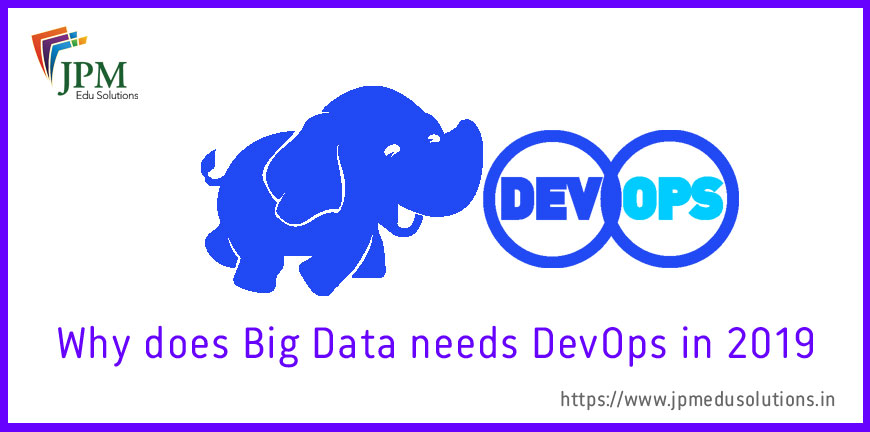

Why does Big Data needs DevOps in 2019
Why does Big Data needs DevOps in 2019

DevOps is a culture which energizes work place practices by unleashing the synergy of the Development and Operations teams working together as a whole. It results in shorter development cycles, increased frequency of deployment, with a high degree of dependency coupled with alignment to business needs.
Big Data consists of highly voluminous and complex data sets. Due to its immense size, the traditional data processing application software cannot cope with the volume. Big Data poses many challenges, among them are: Capturing and storing data, analysis, search, sharing, transfer, query, visualizing, updating methodology as well as privacy of stored information.
The main goal of Big Data is to increase the processing speed of the data from various sources such as mainframes, relational database management systems, flat files on a Hadoop cluster, Opensource software utilities. To crunch such data requires using Continuous Integration and Deployment or CI/CD patterns.
Why did Big Data form without DevOps?
Big Data throws up a whole new set of challenges to IT Managers. The challenge posed by the analytical sciences portion contained in Big Data lead IT Managers to abandon DevOps. The team performing Big Data analytics in-house, formed a separate group which was again in a silo.
So why does Big Data need DevOps?
IT Managers soon found out that with this separation of functions between the Big Data analytics team and the DevOps group, the old problems of inefficiencies and bottlenecks kept cropping up. In fact, in some cases, issues were getting to be a major headache since some Big Data projects were more challenging and complex than originally anticipated.
The need for better efficiencies and results forced Big Data analytic scientists to revamp algorithms. Since such revamps required different infrastructure resources and the Operations team was kept out of the loop till the final stages, lack of coordination, delay in communication etc. lead to major headaches. This prompted a rethink which lead to the realization that DevOps is needed for Big Data. By combining both, Managers could access and analyze Big Data easily and gain valuable business insights and a competitive edge.
How are DevOps and Big Data integrated?
The CI/CD patterns of DevOps have to be made applicable to Big Data and this is achieved by the following method:
- Code assets that ingest and transform Big Data are sent through a pipeline. This should be compatible with the quality gate as it moves through Development to Pre-Production to Production.
- The CI/CD pipeline has to trigger and track deployment from Development to Production.
- As the data moves from Development to Production stages, it need support testing of code as well as data.
How Test Automation of Big Data and DevOps in an integrated system carried out?
The following steps are carried out in Test Automation. It carries out a review of the quality of code and data as it flows through the pipeline.
- Unit Testing – automated test scripts are created to check if units of code are functioning as intended.
- Static Code Analysis – there are tools available which can be used to provide for continuous quality checking of the code, so that it meets quality standards before it is released for production.
- Functional Testing – data validation ensures that the output obtained matches the expected output as the data is moved through each zone.
- Integration and Regression Testing – this ensures automation of tests beginning from the source system up to the app zone. This enables, fast and accurate testing from end to end, whenever code enhancements, configuration changes etc. is carried out. This ensures the product is error free.
- Performance Tests – This can be done by way of using Cloudera Hadoop cluster resource utilization statistics. These stats can be used to compare average job run times plus resource utilization as compared with standard benchmarks and/or baselines. It gives an accurate picture of how the system is working.
Some of the sample test cases for Data are:
a. Missing, truncation, mismatch of data,
b. Null, wrong translation of data
c. Misplaced data and
d. Extra records.
Integrating Big Data and DevOps will definitely throw up some challenges. The basic requirement is that the Operations side of the business must get acquainted with the Big Data platforms. Once the integration process is completed, it will give a huge competitive edge to the business.
DevOps is definitely for those aspiring IT professionals who want a challenging and rewarding career in the IT field. Get proper DevOps training and certification today.








Quick Enquiry